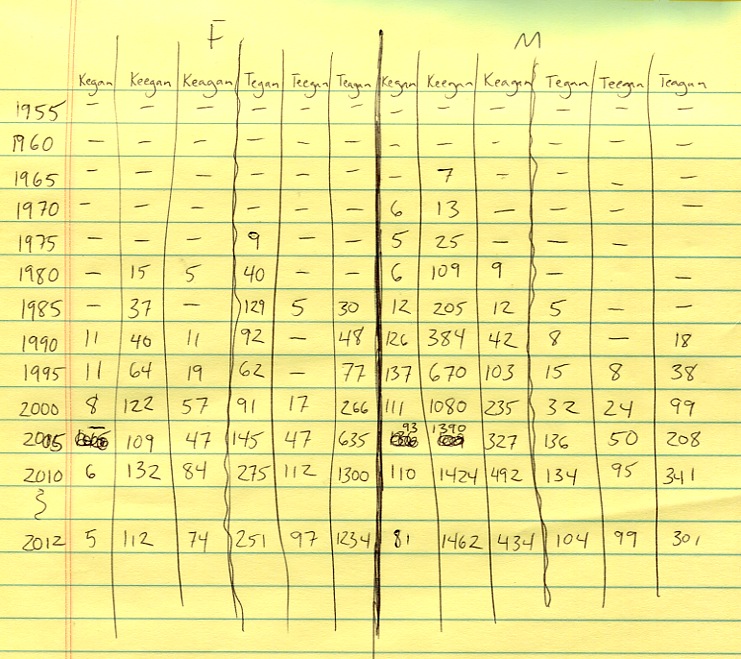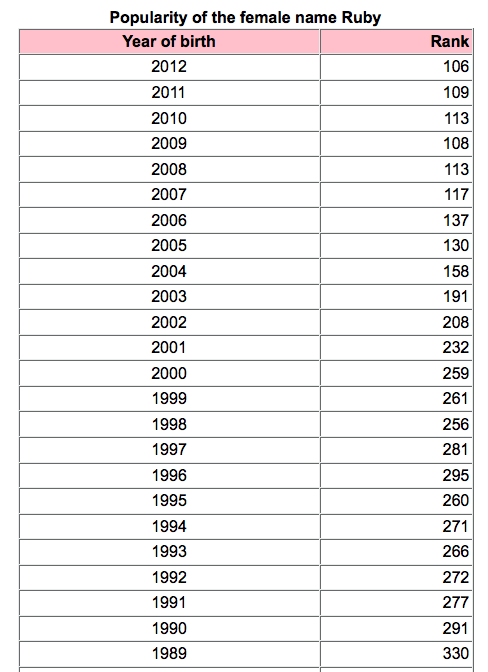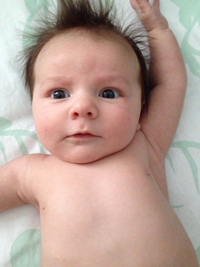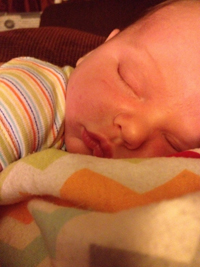Leah writes:
My husband and I are hoping you can help us with a naming decision that is causing us a lot of trepidation. I have been reading your posts for a while now, and have yet to come across another problem like it. It is the kind of problem adoptive parents of older children face, and I’m wondering if your readers wouldn’t have some helpful insight, as well.
We have been incredibly blessed to have guardianship of two beautiful, young children who are not biologically related to us. Recently, their biological parents’ rights were terminated, which opens the door for us to adopt them. We are thrilled.
The problem is that both children have names that we are not very fond of. We have already settled that the younger child, an infant, will be renamed at the time of adoption. Our conundrum lies with the older sibling, who is a twenty seven month old girl.
Because I would like to maintain her anonymity, I will refer to her as D’Ahnyttah Rose (pronounced Donetta Rose). This name mirrors her given name in many ways, and the issues with her name as we see them follow:
1. It is difficult to spell. I often have to spell it 3 or 4 times to people before they get it right.
2. The pronunciation of her name is not obvious. If her name is printed somewhere people always have to ask how it is pronounced, which gets tedious.
3. She was given her name by someone who, for all intents and purposes, abandoned her, so I feel like the name has a lot of baggage associated with it.
4. Her middle name is for a biological relative who is now incarcerated for a violent crime.We really can’t see leaving her name as it is now. So these are our options, as we see them:
1. Change her first name so that it is phonetically correct (i.e. Donetta), keep her middle name and leave it at that.
2. Change her first name to something that is similar to her given name but more pleasing to us (Donna or maybe even Danielle), although we aren’t really in love with any of the obvious options.
3. Using a derivative nickname (like Nettie) may be an option, as there are a couple of nice choices, but we still don’t LOVE any of them.
4. Use her middle name, which we like quite a bit. We are, however, very concerned about the negative association.
5. Choose an entirely new name (i.e. Hazel Grace) as we have for her sibling.Of course there are lots of other things to consider, the least of which being is it even OK to rename a two year old? I know we can, but I am concerned that it may further confuse our daughter, or at least take some serious getting used to on her part. Everything else aside, the ultimate goal is to come to a decision that causes the least amount of stress to her in the long run.
It’s difficult: I can offer an opinion, but I don’t feel I have enough personal experience with it to be confident in that opinion. If a group of people who had had their names changed at adoption told me that it was a terrible mistake, I’d change my opinion on the subject immediately. And of course the particulars of the individual situation factor into it hugely.
But after that lead-in, I will say that it seems okay to me as long as the child is quite young. SPIN seems important: a name-change could seem like it’s a way to erase or hide the old self or the old family (and in fact adults do sometimes change their names for those very reasons)—or it can be seen as a mark of bonding/transition/welcoming into a new family (as when any new baby is named, or as when a person takes a new surname at marriage, or as when a person takes a new name as part of a religious or cultural transition).
Age two still seems okay to me (my nephew is two, and I can picture his parents changing his name without traumatizing him), though I’d try to make the transition easier by not switching all at once. Depending on the personality and age of the child, I might come up with a story: something along the lines of “Now that you are in our family forever, you will have your special new name!”—or books on adoption may have other tried-and-true suggestions. With a two-year-old, I might save the stories for later questions and instead just start calling the child by both names for awhile: D’Ahnyttah-Hazel for awhile, then maybe Hazel-D’Ahnyttah, then sometimes dropping the D’Ahnyttah and sometimes still including it, then eventually dropping the D’Ahnyttah entirely around the time she starts referring to herself by the new name and/or responding to it consistently and without wrinkled brows.
Let’s talk for a minute about the middle name. If it honors a relative currently incarcerated for a violent crime, that in itself doesn’t put me off. Circumstances matter tremendously: the type of crime, the situation surrounding it, the type of person the relative is. And of course that’s getting well outside the scope of what would be appropriate to discuss on the blog. I will give a couple of examples, though, to demonstrate the kind of thing I mean. In one situation, let’s say the relative in question had been badly and hurtfully wronged by a spouse and had attacked that spouse in a one-time, out-of-character fit of passion, but that this person was otherwise a wonderful and loving person with strong family connections, someone likely to be involved in your child’s life in the years to come. Well, then, their name is still good, and I wouldn’t even mind moving it to the first name position. Let’s say instead that the relative in question is a manipulative mooching person with a long history of betrayals and bad deeds that finally culminated in a robbery that went wrong and ended with a terrible injury to an innocent person, and yet this relative is still acting self-pitying about the whole thing and trying to mooch money out of relatives. Well, then, I’m inclined to ditch the name. The line is probably here: can you tell this relative’s story in a way that doesn’t make the child embarrassed to have the name? That is, can this be, “Yes, Rose was the name of your aunt when you were born”? Or must the violent crime come into it, and is the violent crime an upsetting one that would make the child feel tainted by association?
I like your idea of searching for a name that has some connection to the original name. That is, if the child’s name really were D’Ahnyttah Rose, changing it to something like Etta Rose seems like a very nice compromise. I think I’d abandon the goal of being in love with the name in this case, since so many other goals need to take precedence. I think if I were you, my goal would be to find a name that solved the main issues while also being a big leap up the spectrum of my own taste in names.
I think I’m drawn most to any solution that feels like a compromise. For example, if I picture you instead focusing on finding a first name you’re in love with, then I like the idea of keeping D’Ahnyttah as the middle name. Names can be so tied in with identity that even though she’s only two I wonder if later on she might prefer to still own some of her original name. With other questions that involved adoptions, I notice I pretty much always come down on the side of keeping the original name (ideally with original spelling) in the name SOMEWHERE: even though there is baggage associated with the child’s origins, the child might feel those origins are still his or her property, and/or that those origins don’t reflect badly on the name or on herself/himself.
If you like the middle name, one option is to switch the middle and first. Rose D’Ahnyttah.
One factor to consider here is that her sibling will be completely renamed. I’m not sure what effect that will have later on: right now, of course, the infant doesn’t care at all; when the girls are older and hearing their stories and asking questions, it might factor in. If you change one sister’s name completely but only partly change the other’s, probably it’s plenty of explanation to say, “Because Hazel was older and knew her name, but Olive was only a baby and didn’t know her name yet.”
Or one possibility to consider is to make the same decision for both girls’ names: former first names in the middle name position, with new first names for both, for example; or D’Ahnyttah Rose and Neveah Grace become Etta Rose and Norah Grace, or Rose D’Ahnyttah and Grace Neveah. Again, I would rank LOVE of the name rather low here, and aim mostly for the relief of a name I liked Significantly Better. Or perhaps both girls could be given entirely new full names, with the love of the name ranking high: they are the daughters you love, and you are giving them names you love.
I really don’t know what would be best. It’s so hard to know what the girls themselves will think of things later: this whole thing could be a big shrug to them, or it could be of huge symbolic importance to them (with any of the choices leaving plenty of room for either positive or negative symbolism, so that your choice can be spun as The Wrong One no matter WHAT you chose to do), and we can’t know that ahead of time. And it’s not as if The Right Way To Do Adoption is carved in stone for us anywhere: situations are different, and the current feelings about What Is Best change all the time and never do fit everyone anyway, and different people see different actions as symbolizing different things. None of us has an answer that is right for all people in all situations.
I notice my opinion shifts around quite a bit when I imagine “what generally seems right” versus “how I might feel if it were me.” When I’m thinking generally about what seems important, I feel like it’s a good idea to keep their original names in their names somewhere. But if I picture it being actually me making the decision about actual children I love, it suddenly gets more challenging: my actual inclination is to make those babies MINE by naming them. Or wait, what if I imagine a good future relationship with the children’s starting family? Then I like the idea of tying our families together: a name from them, a name from us. Or what if the original names are special to me because those were the names the children had when I grew to love them? I might want that part of our history together represented. Or what if I imagine adopting my nephew and niece? Then I want them to keep their own names, because those names are THEIRS and part of who they ARE. It’s confusing.
I think this all goes back to spin. I think that ANY decision you make about the names can be made with love and loving intentions and loving symbolism, and that the important thing is to communicate that love and those intentions and that symbolism when you tell the girls their naming stories.




